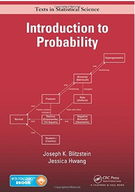At the beginning of the play Rosencrantz and Guildenstern are Dead by Tom Stoppard [28]
Chapter 2, Problem 61(choose chapter or problem)
At the beginning of the play Rosencrantz and Guildenstern are Dead by Tom Stoppard [28], Guildenstern is spinning coins and Rosencrantz is betting on the outcome for each. The coins have been landing Heads over and over again, prompting the following remark: Guildenstern: A weaker man might be moved to re-examine his faith, if in nothing else at least in the law of probability. The coin spins have resulted in Heads 92 times in a row. (a) Fred and his friend are watching the play. Upon seeing the events described above, they have the following conversation: Fred: That outcome would be incredibly unlikely with fair coins. They must be using trick coins (maybe with double-headed coins), or the experiment must have been rigged somehow (maybe with magnets). Freds friend: Its true that the string HH. . . H of length 92 is very unlikely; the chance is 1/292 21028 with fair coins. But any other specific string of Hs and Ts with length 92 has exactly the same probability! The reason the outcome seems extremely unlikely is that the number of possible outcomes grows exponentially as the number of spins grows, so any outcome would seem extremely unlikely. You could just as well have made the same argument even without looking at the results of their experiment, which means you really dont have evidence against the coins being fair. Discuss these comments, to help Fred and his friend resolve their debate. (b) Suppose there are only two possibilities: either the coins are all fair (and spun fairly), or double-headed coins are being used (in which case the probability of Heads is 1). Let p be the prior probability that the coins are fair. Find the posterior probability that the coins are fair, given that they landed Heads in 92 out of 92 trials. (c) Continuing from (b), for which values of p is the posterior probability that the coins are fair greater than 0.5? For which values of p is it less than 0.
Unfortunately, we don't have that question answered yet. But you can get it answered in just 5 hours by Logging in or Becoming a subscriber.
Becoming a subscriber
Or look for another answer
